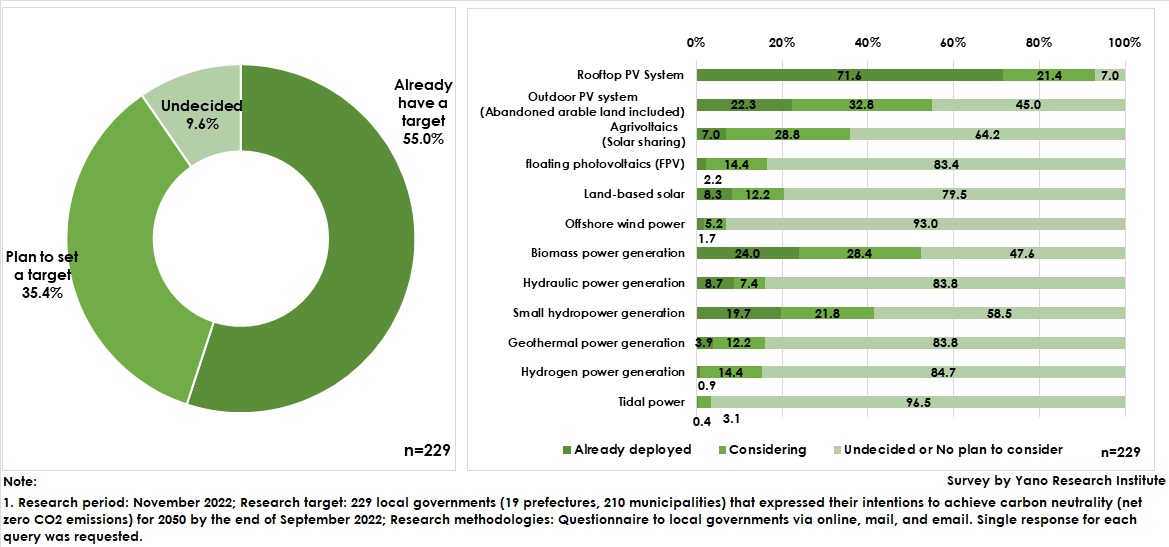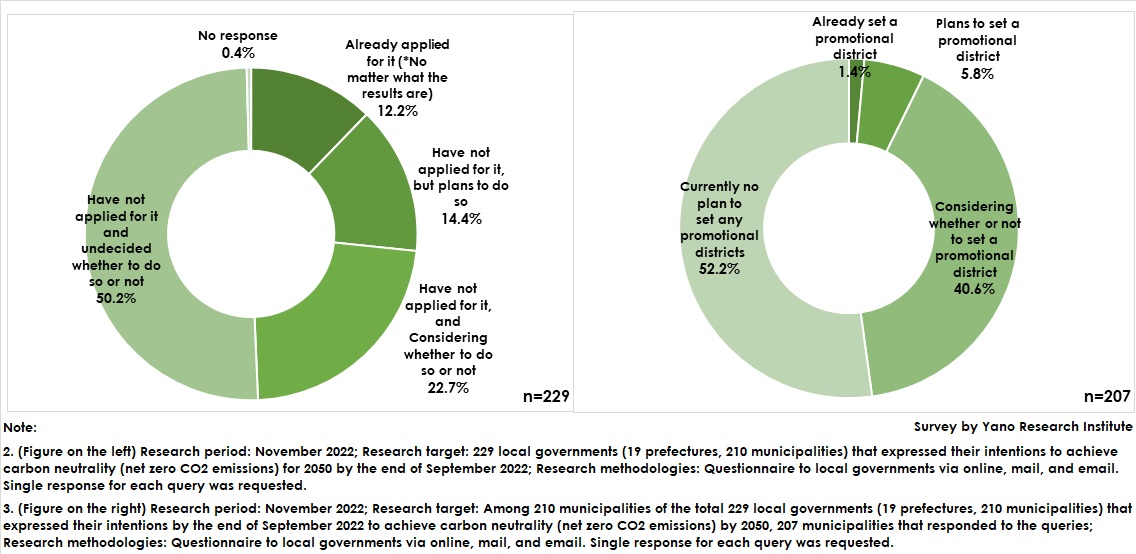No.3177
Questionnaire to Municipalities on Carbon Neutrality Initiatives in Japan: Key Research Findings 2022
To Achieve the 2050 Carbon Neutrality Target, Majority of Municipalities Set the Goal to Reduce Emissions of Green House Gas by FY2030
Yano Research Institute (the President, Takashi Mizukoshi) carried out a questionnaire to municipalities on the initiatives to achieve carbon neutrality (a state of net-zero carbon dioxide emissions) with the cooperation of K.K. Kyodo News, and found out the measures and challenges for municipalities to achieve reduction of GHG emissions and wider use of renewable energy. This press release discloses a part of such findings.


Summary of Research Findings
In this research, a questionnaire was carried out with the cooperation of K.K. Kyodo News to those 229 local governments (19 prefectures and 210 municipalities expressing to be the zero-carbon cities) that had expressed their intentions to achieve carbon neutrality (net zero CO2 emissions) for 2050 by the end of September 2022, aiming to analyze the municipal measures and challenges in reducing local GHG (green-house gas) emissions and toward wider use of renewable energy.
When asked about the status of setting local GHG emission reduction targets for FY2030 (single response), 55.0% of municipalities responded “Already have a target” and 35.4% responded “Plan to set a target”, which resulted in the total 90.4% of local governments either had set or were considering setting GHG emission reduction targets for FY2030. The survey results indicated that more and more municipalities were using the GHG emissions reduction target for FY2030 as the milestone of the longer-term goal of carbon neutrality by 2050.
The primary measure to reduce GHG emissions during 2023 and 2030 is the expansion of utilizing electricity from renewable energy sources. When asked about the deployment and utilization of systems for renewable energy sources, municipalities that installed a roof-top PV (photovoltaic power generation) systems (*1) accounted for 71.6%. The rate exceeded 90% when including those municipalities considering doing so (21.4%), making rooftop solar power systems to precede in the deployment among renewable energy systems for until 2030.
Some municipalities that focus on expanding the deployment of rooftop PV systems were taking a measure to encourage it, e.g. subsidies, not only to newly-built constructions but also to existing buildings. For the case of the installation on a rooftop of an existing building, some municipalities implemented site studies to find out whether additional installation was available due to a concern over durability against the weight.
Meanwhile, for the PV power generation technologies, the next-generation, flexible product development, using light-weight and highly-flexible materials, was underway, including Perovskite Solar Cells. If such next-generation solar power generation technologies that were hardly affected by the limited installation locations became available, they could be the factor for roof-top PV systems to widespread exponentially regardless of newly-built or existing constructions. This, in turn, could heighten the effectiveness of the measures of promoting roof-top PV systems for the expansion of renewable-energy derived electricity.
*1) Characteristics of roof-top PV (photovoltaic power generation) system:
Power generation takes place through solar panels installed on a rooftop of a building, which enables to install anywhere regardless of whether in urban districts or residence areas. In addition, the burdens of installation cost, the time taken from planning to commencement of power generation, and operation management are lower than other renewable energy systems.
Noteworthy Topics
More than 40% of Municipalities Considering Whether or Not to Set a Renewable Energy Promotional District
In 2022, the government started calling for the "Decarbonization Leading Areas (DLA)" project (*2) and enforced the "Revised Act on Promotion of Global Warming Countermeasures" as their measures to promote carbon neutrality in local areas.
The calls for "Decarbonization Leading Areas (DLA)" project took place twice, from January to February and from July to August in 2022, in which 46 districts (26 districts in the first call and 20 in the second) were selected, becoming qualified for receiving grants for transitions to regional decarbonization and for promoting renewable energy.
When asked about having or planning to apply for the DLA project (single response), 22.7% of the municipalities responded “Have not applied for it, and considering whether to do so or not”, and 50.2% responded “Have not applied for it and undecided whether to do so”. As the government has planned to select at least 100 locations as the DLA, it needs to take measures to urge the applications by the municipalities that were considering or undecided to apply for the calls.
The Revised Act on Promotion of Global Warming Countermeasures that came into force in April 2022 enabled municipalities to set the district for promoting decarbonization utilizing renewable energy sources (Renewable energy promotional district*3)
When asked about the status and plans for setting any renewable energy promotional districts (single response requested to 210 municipalities), of the 207 municipalities responded, 40.6% said “Considering whether or not to set a promotional district”, and 52.2% responded, “Currently no plan to set any promotional districts”. Of those local governments that responded “Considering whether or not to set a promotional district”, about half of them responded that they were collecting the preceding cases of promotional districts or were seeing through the advantages and disadvantages in setting such districts. The survey results found out that many municipalities were showing cautious attitudes to set the promotional districts.
*2) What are DLAs (Decarbonization Leading Areas)?
DLAs are the regions that address GHG reduction in the fields closely connected to everyday lives at those regions by FY2030, and aim to achieve net zero CO2 emissions derived from electricity consumption at private sector (households, businesses, etc.) and to realize the reduction of other GHG emissions consistent with nationwide FY2030 targets, and also that have the roadmaps until FY2025 to attain such goals.
*3) What is Renewable Energy Promotional District?
It is a system to enable municipalities to set a district where they implement the renewable energy deployment initiatives that can expect contributions to local communities such as electricity provisions at the time of disasters, and where they can collect knowhow from outside by inviting private companies.
Research Outline
2.Research Object: 229 local governments (19 prefectures, 210 municipalities) that expressed their intentions to achieve carbon neutrality (net zero CO2 emissions) for 2050 by the end of September 2022
3.Research Methogology: Questionnaire to local governments via online, mail, and email
About Questionnaire regarding Measures toward Carbon Neutrality
In this research, a questionnaire was carried out with the cooperation of K.K. Kyodo News to those 229 local governments (19 prefectures and 210 municipalities expressing to be the zero-carbon cities) that had expressed their intentions to achieve carbon neutrality (net zero CO2 emissions) for 2050 by the end of September 2022, aiming to analyze the municipal measures and challenges in reducing local GHG (green-house gas) emissions and toward wider use of renewable energy. This press release discloses a part of the findings.
<Products and Services in the Market>
Municipal measures to promote renewable energy
Published Report
Contact Us
The copyright and all other rights pertaining to this report belong to Yano Research Institute.
Please contact our PR team when quoting the report contents for the purpose other than media coverage.
Depending on the purpose of using our report, we may ask you to present your sentences for confirmation beforehand.